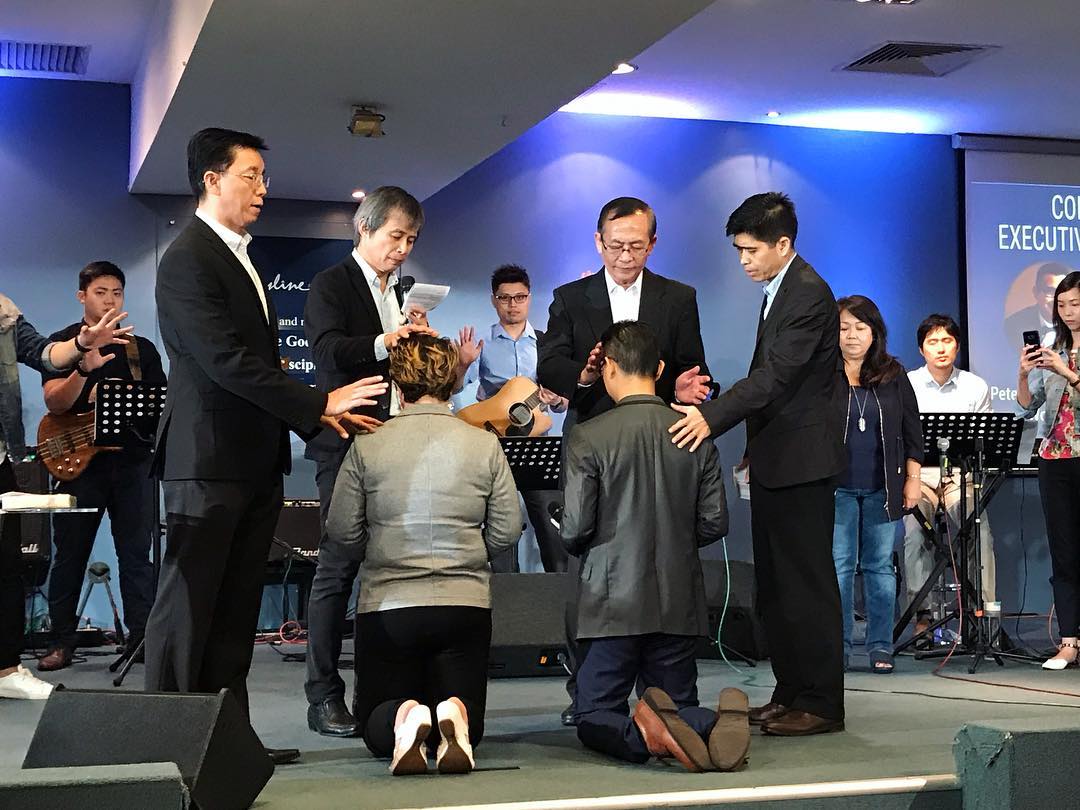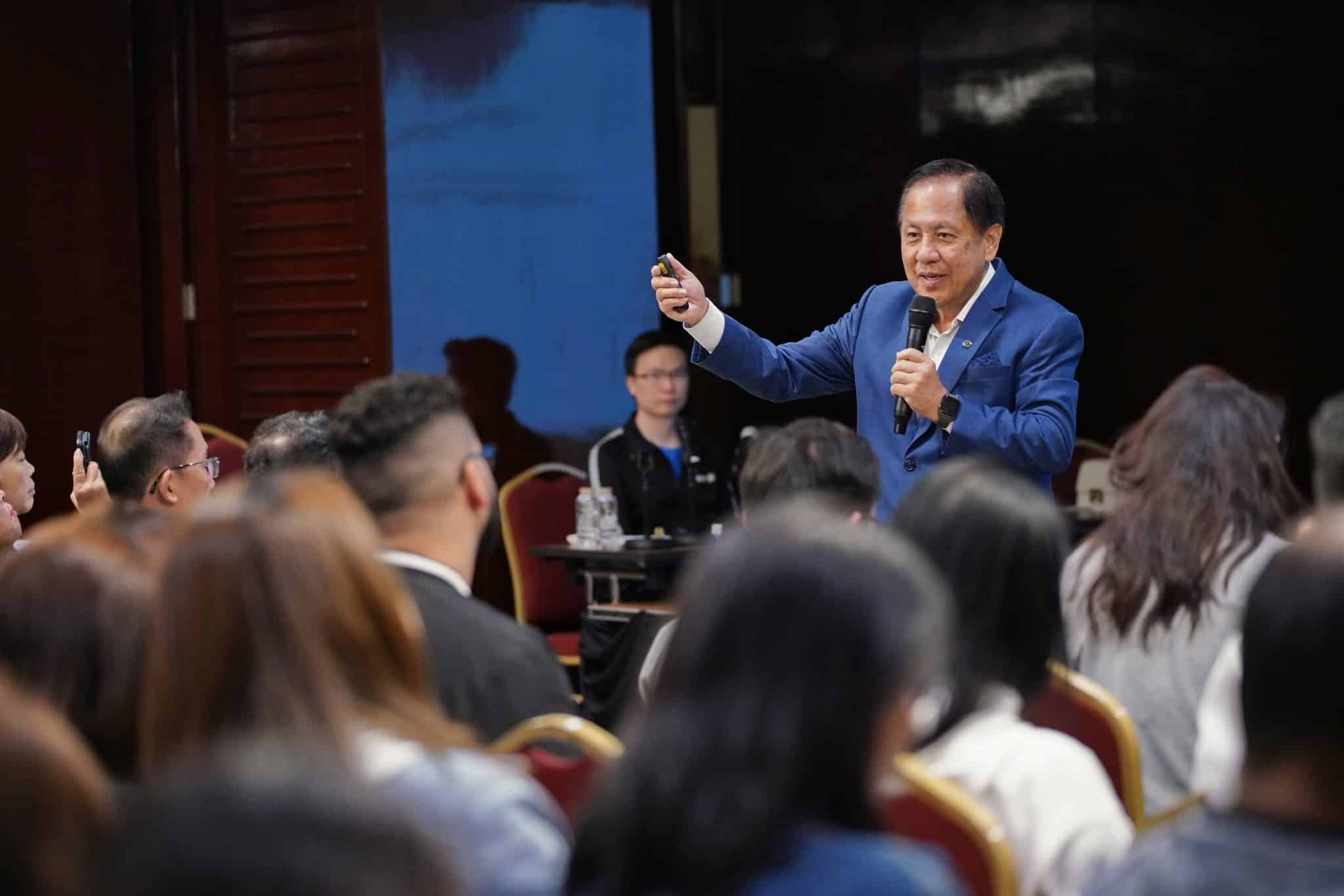“A divine ambush”: Pastor and medical doctor Philip Lyn on how he came to lead a church of 13 marketplace pastors
by Tan Huey Ying // May 21, 2020, 3:00 pm

When Philip Lyn was willing to surrender to God and was willing to give up both pastoring and being a doctor, he discovered that he could do both. All photos from Skyline SIB Facebook page.
Pastor Philip Lyn, 67, still wonders how he ended up saying yes to the “crazy idea” of pastoring a church on top of his day job as a medical doctor.
“Thinking back, I smile now. It was a divine ambush,” he says. “A preacher, yes. A pastor? No.” Ps-Dr Philip recalls almost 20 years after he founded Skyline SIB in Kota Kinabalu, Malaysia. SIB (Sidang Injil Borneo in Malay) is the Borneo Evangelical Church, a Christian denomination in Malaysia.
Today, it has 13 pastors – all “bi-voc” or bivocational like him.
In 2001, he was busy enough as an established doctor, a father of three young children and an elder at a suburban church in Sabah.
But preaching was his passion – birthed after hearing Dr Martyn Lloyd Jones, arguably Britain’s most eloquent preacher, in person at a small church in Oxford.
“I felt I would never make it out alive as a pastor.”
“I was totally blown away and remember the sermon till this day,” recalls Ps-Dr Philip, who was determined to become like Dr Lloyd Jones, with “logic on fire” and “eloquent reason”.
Educated in London, Ps-Dr Philip fast-tracked his theological studies before returning to Malaysia, where he requested to serve out his government bond for his medical studies in Sabah, the country’s “wild, wild East”.
He travelled and preached often, but pastoring was out of the question.

Ps-Dr Philip Lyn founded Skyline SIB in 2001. The 1,300-strong congregation gathers to worship inside the Magellan Hotel in Sutera Resort, Kota Kinabalu.
Holding the baby
“I felt I would never make it out alive as a pastor,” shares Ps-Dr Philip. “I didn’t think I was even remotely cut out for it.”
“In doing so, I morphed into the, then rare, but now increasingly recognised, specimen called the bivocational pastor.”
But God has a way of boring through our supposedly impenetrable spiritual defences and chipping away at our rock-solid arguments, muses Ps-Dr Philip.
One day, his pastor invited him to plant a church in the city and, because there was no one else available, he was asked to “hold the baby” until a pastor could be found.
He reluctantly brought the matter home to Nancy, his wife. Ps-Dr Philip jokes: “It’s a dangerous thing to bring such matters home to your wife, especially if she is a praying woman. After a day in prayer, I found myself saying yes to the whole crazy idea!
“To this day, I still don’t know how it happened. But these 20 years have been without doubt the most exciting, challenging, enriching and rewarding years of our lives.”
Ps-Dr Philip shares with Salt&Light his journey as the bivocational senior pastor of Skyline SIB.
You are doctor by training and a pastor “by default” and by “divine ambush”. Why did you decide to stay on in both roles?
I worked as a doctor for 17 years: five years initially with the government hospital and 12 years in private practice before I became a pastor in 2001.
I was called to combine medicine with pastoring and to serve God in the workplace equally and fully in both.
When I first became a pastor, virtually every pastor I knew challenged me to give up doctoring so I could concentrate “full time” on the church. That was supposed to be the only valid call. Or if both were valid, then the infinitely higher call.
To do anything less, I was told, was to be double-minded (James 1:8).
The voices got louder as the church grew from a small plant to a congregation of several hundred.

Ps-Dr Philip (left) baptising a church member in the swimming pool of Sutera Resort. When the church started growing rapidly in 2003, Ps-Dr Philip knew he needed more pastors to serve alongside.
“Should I give up medicine and go full time?” I asked God several times to release me from doctoring and asked for a confirmation, but it never came.
Then I had a dream. In it, I lost my medical graduation gown at my convocation. No gown meant no entry, no entry meant no degree, no degree meant no doctoring. As I walked away from the ceremony, I discovered my gown lying at the bottom of a grand staircase. As I reached out to retrieve it, I woke up. God was trying to say something.
I realised it was not an either-or dream.
The real question was whether I was willing to surrender to God and be defined by Him alone – not by either medicine or pastoring. The moment I was willing to give up both, I discovered I could do both!
I became convinced I was called to combine medicine with pastoring and to serve God in the workplace equally and fully in both vocations. In doing so, I morphed into the, then rare, but now increasingly recognised, specimen called the bivocational pastor.
Skyline church now has a Sunday attenance of 1,300.
Skyline was founded in 2001. It is now 2020 and you are still “holding the baby”.
The one thing that continues to make all the sacrifices worthwhile is seeing transformed lives: Pre-believers coming into the Kingdom and being transformed into leaders, families healed and restored, workplace believers reaching out as a new breed of ministers, younger leaders becoming pastors and elders of the church.
Above all, seeing how God has transformed Nancy and I and our family.
The greatest highlight? The resurrection of my four-year-old daughter from the dead in our second year of pastoring Skyline. That was seventeen years ago. Nothing comes close.
The resurrection of four-year-old Sarah Lyn: A father’s experience of the life-giving Word
Where do you find the time to keep up with such heavy responsibilities? What is the biggest challenge for a bivocational “bi-voc” pastor?
Time is a premium.
Essentially, all bi-voc pastors must have stability in their marriage, family, finance and work. If they are married their spouses must be fully on-board with them in this. Once these basics are there, the rest is art.
“Bivocational pastors will always be relevant, teaching and sharing out of their day-to-day experiences in the workplace.”
The greatest potential challenge to bi-voc pastors is what I would call “squeeze room”. This means if major challenges hit in one of the four main areas of life – marriage, family, work and finance – a bi-voc pastor has much less space and time to deal with them.
It is especially hard when drained by these circumstances to continue leading the church, ministering, planning and charting for the days ahead. One needs to dig deep spiritually, return to the basics, take clear restorative actions and see it out while “on the go”. Teamwork and cross covering at such times are essential.
The area I find most draining? Family challenges, especially if one of my children tracks into unwise decisions. Time is needed to restore and heal our relationships and steer the loved one back.
Skyline’s 13 pastors all have full-time jobs outside the church. How did you build up such a team?

At the dedication ceremony in 2019 of Skyline SIB’s newest bivocational pastors, bringing the total pastoral count to 13.
In the first two years, I found myself increasingly stretched and realised that a bigger pastoral team was needed. I challenged workplace leaders to function pastorally and only after they had proven themselves, to be ordained and titled as pastors.
Because I ministered as a bi-voc pastor and modelled it, no one ever saw a problem with being bi-voc. It was the natural thing to do!
Bi-voc ministry in time became the norm for us.
Today all 13 of our pastors are bi-voc. We range from doctors to lawyers, business people to IT specialists, managers to teachers. All of whom see ministry in the workplace and church as one and the same calling.
I now believe Skyline church is called to be a bivocational church and model that ministry.
Why groom unpaid bivocational pastors?
The first and biggest benefit is that it frees up the church finances. In most churches, payroll takes up anything from 40-60% of the budget. This means greater surpluses for ministry, missions and purchases of properties and hardware.
“Because I ministered as a bi-voc pastor and modelled it, it was the natural thing to do!”
Secondly, and invariably, pastors are home-grown. They already own the church culture and vision and this synergy makes for fast and powerful teamwork.
Thirdly, they are some of the best leaders. Many young people in the workplace are already providing leadership at different levels: They know how to budget, chart, relate, trouble-shoot, communicate, persevere and multi-task.
To get them into full-time ministry may be difficult. To give them a vision that they can serve God as bivocational pastors fires them up like nothing else! Many find it incredibly humbling and fulfilling.

The pastoral team of Skyline SIB Kota Kinabalu. Pastor Philip and all 13 pastors on the team are bivocational pastors who work and serve full-time.
Bivocational pastors will always be relevant.
“To give marketplace leaders a vision that they can serve God as bivocational pastors fires them up like nothing else!”
They will be teaching and sharing out of their day-to-day experiences in the workplace. They are never far away from the challenges the average church member faces. Their workplace faith will be continuously tested so they are always having to “walk the talk” and thrive in an already challenging environment. This bias is a tremendous asset in mobilising the church into the workplace.
But of course, we remain open about having full-time pastors and I have always seen both types of ministries as necessary and complementary for the church today.
What is it like pulling double duty in a pandemic like this?
It is a privilege to be able to function as both a doctor and a pastor in this COVID-19 pandemic. Both vocations are needed. Both are well-received and respected.
“In 2019, I sensed the Lord stirring my heart that boldness was vital to get through the following year.”
And both carry influence for the Kingdom of God. I am truly humbled by the opportunity.
I tell my church to pray for me. Although I am not at the front of the frontliners, I am at risk as a doctor. My age makes me a high risk. My kids are adamant I shouldn’t work. But I just follow God’s leading and my conscience.
This is also a time to reach out and minister to many who are facing issues of fear, anxiety, depression or family and financial challenges.
In the last quarter of 2019, I sensed the Lord stirring my heart that boldness was vital to get through the following year. It would be a very tough year despite the bright picture of growth many economists predicted. We had a leaders conference at the end of 2019 called BOLD. So I told the leaders that would be our theme for 2020.
Little did we know that by the first quarter of 2020, we would experience the perfect storm: a sudden change of government, the COVID pandemic and the huge drop in oil prices that would rock our nation and our economy.
I preach both faith and comfort, spiritual warfare and peace, spiritual contention as well as surrender. There must be a biblical balance.
We can’t let the virus mess around with our minds and bring fear and we can’t let the enemy beat us into submission. We comfort and strengthen those who suffer, but we continue to decree God’s grace and victory over the virus and the situation.
At the same time, we are initiating practical ways online to support our parents with young kids. The partial lockdown is driving them nuts. We have also given towards the purchase of protective equipment for our state and are giving food to the hungry and the families of daily wage earners who have lost their jobs.
Boldness arising from intimacy with the Lord (Acts 4:13) is essential for these days.
“If God doesn’t heal, then what?” A question Pastor Philip Lyn grappled with
Ps-Dr Philip Lyn will be speaking at the upcoming Eagles Proclamation and Persuasion Institute (EPPI) 2020 organised by Eagles Communications. More details on the revised date of the preaching conference will be provided soon.
We are an independent, non-profit organisation that relies on the generosity of our readers, such as yourself, to continue serving the kingdom. Every dollar donated goes directly back into our editorial coverage.
Would you consider partnering with us in our kingdom work by supporting us financially, either as a one-off donation, or a recurring pledge?
Support Salt&Light



